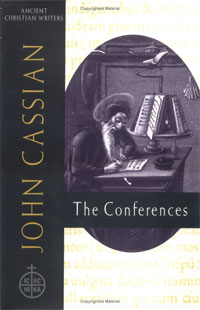Book Notes
 John Cassian, The Conferences, translated and annotated by Boniface Ramsey (New York: The Newman Press, 1997), 886pp.
John Cassian, The Conferences, translated and annotated by Boniface Ramsey (New York: The Newman Press, 1997), 886pp.
Like many early Christian writers, the life of John Cassian (c. 360–c 435) remains shrouded in the mists of forgotten history. He was probably born in present day Romania (Dacia). When he was about twenty he traveled with his friend Germanus to Bethlehem where he joined a monastery. From Bethlehem Cassian and Germanus made at least two extended visits to the famous monastics down in Egypt (by some estimates they spent ten years there), and from there moved on to Constantinople. In Constantinople the bishop John Chrysostom ordained Cassian to the diaconate some time around the year 400, at which time he traveled to Rome to courier some letters and was ordained a priest by Pope Innocent I. Cassian later settled in Marseilles, where he founded two monasteries, and wrote three books. His Conferences, along with its much shorter companion volume entitled Institutes, chronicle the riches of early Egyptian monasticism based upon his considerable personal experiences and acquaintances, and in so doing transplanted that monastic influence in the West.
These desert monks are so far removed from our own time, place, and Christian experience that we might well ask why one would read them today other than from a sense of historical curiosity. I suggest two reasons, one from Scripture and the other from experience.
In reading Cassian's firsthand accounts of early desert monasticism, one is humbled by the zeal of their renunciation as they explored what the "hard sayings" of Jesus might mean: "If anyone would come after me, he must deny himself and take up his cross daily and follow me" (Luke 9:23). "If anyone comes to me and does not hate his father and mother, his wife and children, his brothers and sisters—yes, even his own life—he cannot be my disciple" (Luke 14:26). "If you want to be perfect, go, sell your possessions and give to the poor, and you will have treasure in heaven. Then come, follow me" (Matthew 19:21). Nor was theirs a mere theoretical inquiry, for the monks prized practical experience and certainly spiritual experimentation above all things. Cassian's Conferences report their conclusions. The monks would never suggest that a life of solitude in the desert was for everyone, and in fact they affirmed that each person is fit for a certain "orientation" in life due to many factors, some beyond their control, and the chief of which is God's call on your life. All Christians, then, must discover a way to live these words of Jesus.
Practically speaking, I have never read any Christian literature that explained myself to myself as well as these monastics. Just what did they find when they fled to the lonely interior of the Egyptian desert? They experienced a raging battle in the geography of the heart, what John Chryssavgis calls a "spirituality of imperfection" that might be thought of as a sustained effort to discover what Paul meant in Romans 7:7–25. Germanus, for example, asks his elder: "Why is it, then, that superfluous thoughts insinuate themselves into us so subtly and hiddenly when we do not even want them, and indeed do not even know of them, that it is very difficult not only to cast them out but even to understand them and to catch hold of them?" And that's only the beginning of the battle for wholeness of the heart. Read through these pages and you discover a remarkable candor "without any obfuscating embarrassment" and that does not in the least "despise anyone in belittling fashion" for their failure and frailty. Here is a quick list of only a few maladies that I underlined—sleeplessness, vile dreams, impulsive urges, seething emotions, foolish fantasies, pious pretense that masks as virtue, clerical ambition, pernicious despair, confusion, wild mood swings, flattery, and lust. The list is almost endless, and these are only those symptoms of ill health we know: "There are many things that lie hidden in my conscience which are known and manifest to God, even though they may be unknown and obscure to me."
Paradox and humor are never far away. Why, Cassian wonders, would a monk renounce great wealth, then exhibit intense possessiveness or irascibility over a pen knife, a needle or a pen? Or consider his description of a monastic church service that includes "coughing or clearing our throat or laughing or yawning or falling asleep." These desert ascetics were brutally realistic about our human condition, and unfailingly tender because of it. Nor were they hopeless, but confident that we can make progress through vigilance and trust in God's grace, even though, paradoxically, the more mature you become the wiser you are regarding your own many failures. "We are," after all, "only human beings."
We read in Hebrews 11:37–38 of early Christians who "went about in sheepskin and in goatskin, in distress, afflicted, needy, the world unworthy of them, wandering in deserts and mountains and caves and caverns of the earth." I am not called to be a monk, but I am called to wrestle with "the flighty wandering of the human mind" in order to experience purity of heart by following "the proven compass of love." Thank God for these heroes of faith, and for Cassian's labor of love in recording their blessed memory and example. This is a long book, but I was somehow sad when I came to its end, as if I had left behind trusted, tender, and very wise guides.


